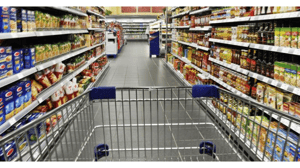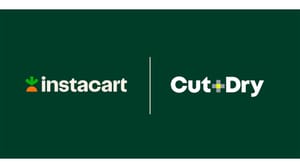My Organic Market: Where Mom Knows Best
MY ORGANIC MARKET EXPECTS EMPLOYEES to live the lifestyle they're helping to sell. New associates are given a green package when they begin working at any one of the five stores located in and around Rockville, Md. Inside each kit are compact fluorescent light bulbs, programmable thermostats, and sensors to alter interior lighting based on available natural light. Associates are encouraged to eat
March 1, 2008
CHRISTINE BLANK
MY ORGANIC MARKET EXPECTS EMPLOYEES to live the lifestyle they're helping to sell. New associates are given a “green package” when they begin working at any one of the five stores located in and around Rockville, Md. Inside each kit are compact fluorescent light bulbs, programmable thermostats, and sensors to alter interior lighting based on available natural light. Associates are encouraged to eat local and organic foods, which is the mainstay of the stores.
“We have a full-time environmental coordinator on staff,” said Scott Nash, president of the independent chain. “We want to make sure we're walking the walk.”
Or driving the drive. Employees can also receive up to $3,000 in bonuses for purchasing a hybrid car.
My Organic Market, known affectionately by locals as MOM's, has made sustainability a cornerstone of its business. It buys about 1.5 million kilowatt-hours of wind power a year, sources products from local and small producers, recycles batteries for customers, offers produce clippings as free compost on a daily basis and teaches shoppers how they can contribute to a better environment.
“We don't just offer reusable bags. We educate customers on why they are important and why plastic bags are bad,” Nash said.
What goes into those bags is just as important. The vast majority of the products sold in the five stores — each around 10,000 square feet in suburban, middle-income neighborhoods in Maryland and Virginia — do not contain preservatives, additives or hydrogenated oils; they are often organically grown.
Products that do not meet these standards often do not last long on the shelves.
“There are products out there that the customers like, but we had to get rid of them. We want people to shop unconcerned, not having to read every ingredient label,” Nash said.
Standards also apply to overall sourcing, as well as packaging. For example, MOM's executives are reconsidering which brands of bottled water the chain will sell, since some bottled water is shipped to the United States from other countries.
“We're looking closely at our water section and where the water comes from,” Nash said, noting that the goal is to bring the sources closer to home. “We're looking for stuff that is more domestic.”
Indeed, Nash says, local is a “big craze” now, and MOM's buys from local artisan bakeries and cheese makers. It also procures local meat, produce, eggs and other products from a number of small food manufacturers and local farms. It's a process that Nash says goes more smoothly than one might expect.
“We have a team of buyers who do a lot of research,” he said. Some manufacturers ship their products via UPS or combine loads of their products on trucks already bound for the stores.
MOM's has come a long way since Nash started the company 20 years ago. Originally, it was an organic food delivery service called Organic Foods Express. Like many other organic pioneers, he started the company out of his garage, then rented a 2,000-square-foot warehouse to sell organic products to the public three times a week.
Nash is happy the retail business is doing well — sales have jumped between 30% and 50% a year since the first store opened in 1996 — so he doesn't have to rely on the delivery operation any more.
“That is a very, very difficult business, so it was fine with me when retail overtook mail order and delivery,” he said.
However, retailing came with its own challenges. A month after he opened his first store, the first Fresh Fields unit opened nearby. Competition was fierce for a while, but Nash was able to hang on and nurture a relationship with customers. Whole Foods Market later purchased Fresh Fields, and Nash says he is grateful to the supernatural chain, despite the presence of 20 Whole Foods stores in the region.
“They have exposed a lot of people to organic foods,” he said. “The organic food industry in this entire D.C. area was $15 million. Now, it is probably $700 million.”
In addition to Whole Foods, Trader Joe's and Balducci's, several major supermarket chains have units near MOM's stores, including Harris Teeter, Giant, Safeway, Bloom and Costco. But Nash believes the environment only helps recruit customers for MOM's — once shoppers get to know more about organic foods, they usually start patronizing a MOM's store.
“They incubate people for us. After a couple of years of shopping at Whole Foods, [customers] start living the lifestyle, and are seeking what we offer,” Nash said.
MOM's fills a niche by catering to the core organic shopper, Nash added. For example, the 100% organic produce department is different from those in other stores in the area, which also carry conventional items.
MOM's stores are typically located in middle-income, racially diverse suburban neighborhoods, but shoppers are also willing to travel from other middle- or upper-income neighborhoods.
“We are a very destination-oriented business, so we don't need upscale demographics immediately surrounding our stores,” Nash said. “Our customers don't compromise on the quality of food they purchase.”
In fact, MOM's has done well by opening stores in developing neighborhoods that other retailers have avoided. In one recent case, MOM's executives were advised not to open a store at a shopping center in a lower-income area in Columbia, Md.
“As it turns out, it has had the best first 12 months' performance of any of the stores we have ever opened. We took a center with not a single commitment from a national chain, and have gotten such co-tenants as Starbucks and Panda Express,” Nash said.
MOM's does have expansion plans. Nash hopes to have 15 stores up and running by 2015, all within a 100-mile radius of the Rockville area.
In the meantime, Nash said, the chain will continue to focus on what it does best, which is not the same as a traditional supermarket or a large natural foods chain.
“We're not trying to be all things to all people,” he said. “Trader Joe's and Costco are our models. They have a niche, they do what they do best, and they don't get distracted.”
About the Author
You May Also Like




